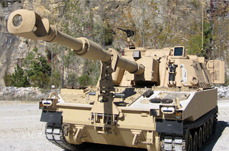WASHINGTON, July 1, 2010 — Unity of purpose in Afghanistan is essential to winning the counterinsurgency fight in the country, the new commander of U.S. and NATO forces in Afghanistan said today.
During a news conference at NATO headquarters in Brussels, Belgium, Army Gen. David H. Petraeus and NATO Secretary General Anders Fogh Rasmussen both called for increased cooperation. It was Petraeus’s first appearance since the Senate confirmed him for his new job yesterday.
The general briefed the alliance’s North Atlantic Council and allied nations with troops on the ground in Afghanistan. During the meeting, Petraeus received three clear messages from the 46 International Security Assistance Force partners, Rasmussen said. “First, the general has our full support,” the secretary general said. Second, the ISAF nations are united in supporting the strategy in Afghanistan. “This has been a change of command, but not a change of strategy,” the secretary general said.
Finally, the mission itself has the nation’s and alliance’s full support, Rasmussen said.
“Allies and partners will stay committed as long as it takes to finish the job,” he said. “Obviously, that does not mean forever. Our mission will end when Afghans are capable to secure and govern the country themselves.”
Petraeus stressed the importance of the civil-military partnership in Afghanistan as part of the comprehensive approach to operations in the country.
“We must all work together,” he said. This includes within the U.S. government agencies, within the NATO alliance, within the greater coalition, and especially with the Afghan government.
“We must achieve unity of effort in what is clearly an effort to achieve mutual objectives,” he continued. Nations have mutual objectives, the general noted, because Afghanistan was the breeding ground for terrorist attacks that have killed thousands in the United States, Great Britain, Indonesia, Madrid and other places.
Petraeus thanked the North Atlantic Council for its support.
“It was very heartening to hear the support that was voiced there,” he said, “even as we know the very difficult times that we have seen in Afghanistan, where there has without question been tough fighting and where there have been tough casualties, although where there have also been areas of progress in recent weeks, in recent months, and where we are determined to achieve further progress in the course of the months ahead.”
Petraeus said he fully favors the strategy of protecting the Afghan population and lessening the number of casualties of innocent civilians. “We must maintain the commitment to reducing the loss of innocent civilian life, in the course of military operations, to an absolute minimum,” he said.
He will not revise the rules of engagement that delineate the use of force and the use of close-air support, he said, but he will ensure that tactical commanders apply the rules correctly.
“There are concerns among the ranks of some of our troopers on the ground that some of the processes have become a bit too bureaucratic,” he said, adding that he has “a moral imperative as a commander” to use all the force necessary to protect coalition and Afghan forces. He said he has discussed this with Afghan President Hamid Karzai, Defense Minister Abdul Wardak and Interior Minister Bishmullah Khan.
“They absolutely support the intent that I explained to them,” he said, “which was, on the one hand, to maintain the focus on the reduction of loss of innocent civilian life in the course of military operations and also to ensure that our troopers and our means now, Afghan as ISAF, are supported by all means when they are in a tough position.”
The general said that while the Taliban have lost the initiative in certain areas of the country, this means the fighting will get tougher, not easier.
“When you take away the enemy’s … safe havens, the enemy fights back,” he said. “You may recall that in Iraq, the highest levels of violence ever recorded in Iraq were months into the surge. They were very, very high at the beginning of the surge, but they actually went up – vastly.”
The same has been true in Afghanistan, where the American surge is ahead of schedule, and the levels of violence are higher, Petraeus noted. “When we take away what the enemy values, the enemy fights back,” he said.
Source:
U.S. Department of Defense
Office of the Assistant Secretary of Defense (Public Affairs)

 von
von 